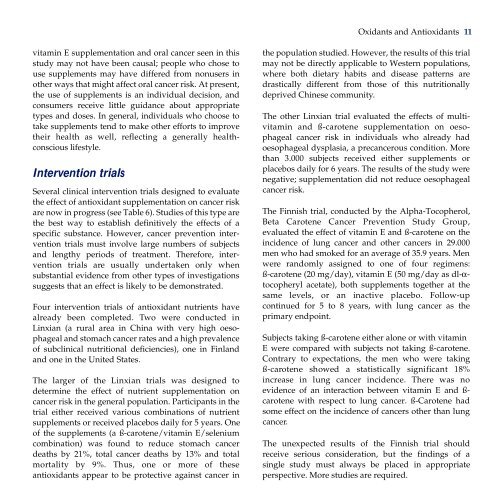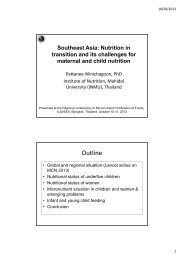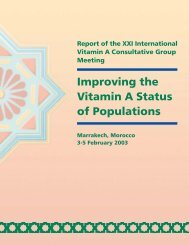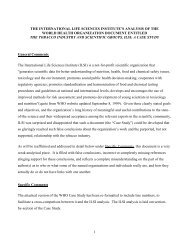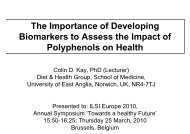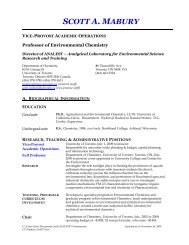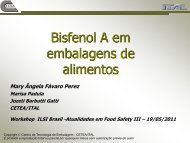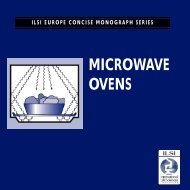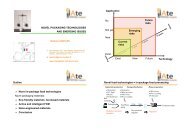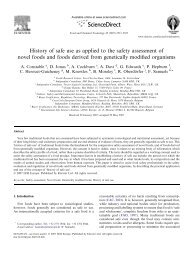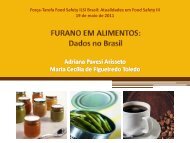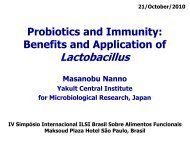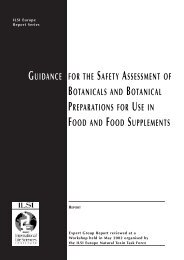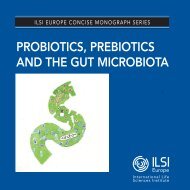Oxidants, Antioxidants and Disease Prevention - Aara-Super food
Oxidants, Antioxidants and Disease Prevention - Aara-Super food
Oxidants, Antioxidants and Disease Prevention - Aara-Super food
Create successful ePaper yourself
Turn your PDF publications into a flip-book with our unique Google optimized e-Paper software.
<strong>Oxidants</strong> <strong>and</strong> <strong>Antioxidants</strong> 11<br />
vitamin E supplementation <strong>and</strong> oral cancer seen in this<br />
study may not have been causal; people who chose to<br />
use supplements may have differed from nonusers in<br />
other ways that might affect oral cancer risk. At present,<br />
the use of supplements is an individual decision, <strong>and</strong><br />
consumers receive little guidance about appropriate<br />
types <strong>and</strong> doses. In general, individuals who choose to<br />
take supplements tend to make other efforts to improve<br />
their health as well, reflecting a generally healthconscious<br />
lifestyle.<br />
Intervention trials<br />
Several clinical intervention trials designed to evaluate<br />
the effect of antioxidant supplementation on cancer risk<br />
are now in progress (see Table 6). Studies of this type are<br />
the best way to establish definitively the effects of a<br />
specific substance. However, cancer prevention intervention<br />
trials must involve large numbers of subjects<br />
<strong>and</strong> lengthy periods of treatment. There f o re, intervention<br />
trials are usually undertaken only when<br />
substantial evidence from other types of investigations<br />
suggests that an effect is likely to be demonstrated.<br />
Four intervention trials of antioxidant nutrients have<br />
a l ready been completed. Two were conducted in<br />
Linxian (a rural area in China with very high oesophageal<br />
<strong>and</strong> stomach cancer rates <strong>and</strong> a high prevalence<br />
of subclinical nutritional deficiencies), one in Finl<strong>and</strong><br />
<strong>and</strong> one in the United States.<br />
The larger of the Linxian trials was designed to<br />
determine the effect of nutrient supplementation on<br />
cancer risk in the general population. Participants in the<br />
trial either received various combinations of nutrient<br />
supplements or received placebos daily for 5 years. One<br />
of the supplements (a ß-carotene/vitamin E/selenium<br />
combination) was found to reduce stomach cancer<br />
deaths by 21%, total cancer deaths by 13% <strong>and</strong> total<br />
mortality by 9%. Thus, one or more of these<br />
antioxidants appear to be protective against cancer in<br />
the population studied. However, the results of this trial<br />
may not be directly applicable to Western populations,<br />
where both dietary habits <strong>and</strong> disease patterns are<br />
drastically different from those of this nutritionally<br />
deprived Chinese community.<br />
The other Linxian trial evaluated the effects of multivitamin<br />
<strong>and</strong> ß-carotene supplementation on oesophageal<br />
cancer risk in individuals who already had<br />
oesophageal dysplasia, a precancerous condition. More<br />
than 3.000 subjects received either supplements or<br />
placebos daily for 6 years. The results of the study were<br />
negative; supplementation did not reduce oesophageal<br />
cancer risk.<br />
The Finnish trial, conducted by the Alpha-Tocopherol,<br />
Beta Carotene Cancer <strong>Prevention</strong> Study Gro u p ,<br />
evaluated the effect of vitamin E <strong>and</strong> ß-carotene on the<br />
incidence of lung cancer <strong>and</strong> other cancers in 29.000<br />
men who had smoked for an average of 35.9 years. Men<br />
w e re r<strong>and</strong>omly assigned to one of four regimens:<br />
ß-carotene (20 mg/day), vitamin E (50 mg/day as dl-αtocopheryl<br />
acetate), both supplements together at the<br />
same levels, or an inactive placebo. Follow-up<br />
continued for 5 to 8 years, with lung cancer as the<br />
primary endpoint.<br />
Subjects taking ß-carotene either alone or with vitamin<br />
E were compared with subjects not taking ß-carotene.<br />
Contrary to expectations, the men who were taking<br />
ß - c a rotene showed a statistically significant 18%<br />
i n c rease in lung cancer incidence. There was no<br />
evidence of an interaction between vitamin E <strong>and</strong> ß-<br />
carotene with respect to lung cancer. ß-Carotene had<br />
some effect on the incidence of cancers other than lung<br />
cancer.<br />
The unexpected results of the Finnish trial should<br />
receive serious consideration, but the findings of a<br />
single study must always be placed in appropriate<br />
perspective. More studies are required.


